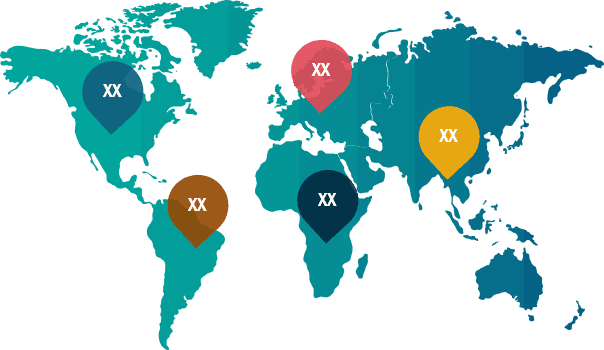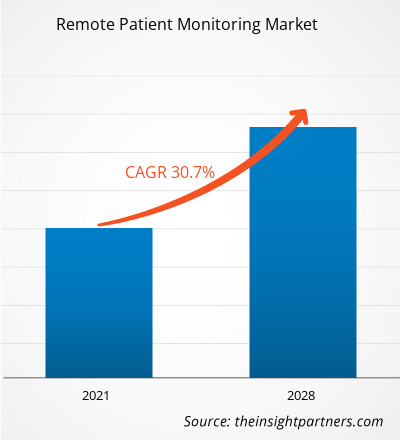[調査レポート] 遠隔患者モニタリング市場は、2021年の290億6,230万米ドルから2028年には1,889億5,222万米ドルに達すると予想されています。市場は2021年から2028年にかけて30.7%のCAGRで成長すると予測されています。
市場洞察とアナリストの見解:
遠隔患者モニタリング システムは、ある場所にある健康モニタリングおよび診断デバイスから患者の医療および健康情報を収集し、別の場所の医師に転送するために使用されるテクノロジーです。最も使用されている遠隔患者モニタリング テクノロジーは、活動と睡眠の両方の測定値を評価できる加速度計です。その他の遠隔患者モニタリング テクノロジーには、疾患活動を追跡するモバイル アプリ、電子ピーク フロー メーター、持続血糖モニタリング、血圧および心拍リズム モニタリング、遠隔咳測定デバイスなどがあります。これにより、患者の入院期間が短縮され、通院回数が減ります。これにより、患者のケアと生活の質がさらに向上します。
遠隔患者モニタリング技術の製品発売の増加は、市場の成長の主な原動力です。たとえば、2021年3月、メドトロニックは、メドトロニック ケア マネジメント サービス (MCMS)(opens new window) 事業が、COVID-19 とその呼吸器症状を心配する可能性のある患者を支援、監視、トリアージするために作成された 2 つの新しいソリューションをリリースしたことを正式に確認しました。この要因は、ヘルスケア モニタリング デバイスの成長を後押ししています。
成長の原動力と課題:
心臓病、糖尿病、脳卒中、肥満などの慢性疾患は、世界中で主な死亡原因であり、これらの疾患は国の医療費の最大の割合を占めています。CDCによると、2018年には全人口の約9%が糖尿病を患っており、米国では下肢切断や腎不全の主な原因となっています。さらに、この報告書は、米国では毎年150万人以上のアメリカ人が糖尿病と診断されていることを示唆しています。糖尿病の有病率が高いという同様の状況は、ヨーロッパ、アジア太平洋、中東、アフリカなどの他の地域でも続いています。国際糖尿病連合が発行したIDF糖尿病アトラスによると、2017年には、南東アジアには世界の糖尿病人口の約19%がいました。
アメリカ心臓病学会財団によると、2018年には心血管疾患(CVD)によるCHDが主な死因となり、次いで脳卒中、高血圧、心不全、その他のCVDがそれぞれ16.8%、9.4%、9.0%、17.9%を占めました。2035年までに、米国では約1億3000万人の成人がCVDを患う恐れがあります。したがって、高齢者人口の増加と関連する慢性疾患により、心臓モニタリング装置やその他のバイタルサインモニタリング装置市場の売上が押し上げられ、予測期間中に世界の遠隔患者モニタリング装置市場の成長が促進されると予想されます。
医療機器の規制要件は世界中で確立されていますが、高度な遠隔監視デバイスには、医療過誤を制御および回避するためのさまざまなガイドラインが必要です。遠隔患者監視デバイスは、患者のデータを記録し、診断のために医師に送信し、分析のために保存するように設計されていますが、その情報が悪意のある人の手に渡った場合の責任についてはほとんど確立されていません。近年、テクノロジーは急速に変化しており、医療機器の適切な使用を保証する規制ガイドラインの形成の必要性が高まっています。プライバシー、セキュリティ、データの所有権、同意などの問題に関する懸念は、予測期間中に遠隔監視医療機器の採用の障害になると予想されます。
要件に合わせて調査をカスタマイズ
弊社の標準サービスでは対応できない分析と範囲を最適化し、カスタマイズすることができます。この柔軟性により、ビジネス計画と意思決定に必要な正確な情報を得ることができます。
遠隔患者モニタリング市場:

CAGR (2020 - 2028)30.7%- 市場規模 2020年
290.6億米ドル - 市場規模 2028年
1,889.5億米ドル

市場の動向
- 慢性疾患の増加
- ヘルスケアに関する意識の高まり
- 在宅治療の需要が高まる
- 患者の定期診察に代わる遠隔患者モニタリング
- 遠隔地における医療施設の拡大
主要人物
- セルナーコーポレーション
- メドトロニック
- フィリップスNV
- バイタルコネクト
- ボストン・サイエンティフィック・コーポレーション
- シーメンス ヘルシナーズ AG
- GEヘルスケア
- アボット
- 日本光電株式会社
地域概要

- 北米
- ヨーロッパ
- アジア太平洋地域
- 南米と中央アメリカ
- 中東およびアフリカ
市場セグメンテーション
 タイプ
タイプ- ソフトウェア
- デバイス
- サービス
 エンドユーザー
エンドユーザー- プロバイダー
- 支払者
- 患者
- その他
 地理
地理- 北米
- ヨーロッパ
- アジア太平洋地域
- 中東およびアフリカ
- 南米と中央アメリカ
- サンプル PDF では、定性的および定量的な分析により、コンテンツの構造と情報の性質が紹介されています。
レポートのセグメンテーションと範囲:
「グローバル遠隔患者モニタリング市場」は、タイプ、エンドユーザー、および地域に基づいてセグメント化されています。タイプに基づいて、遠隔患者モニタリング市場はソフトウェア、デバイス、およびサービスに分割されています。遠隔患者モニタリングソフトウェアセグメントはさらに2つに分かれています。オンプレミスソフトウェアとクラウドベースのソフトウェア。遠隔患者モニタリングソフトウェアデバイスタイプセグメントは、心臓モニタリング装置、神経モニタリング装置、呼吸モニタリング装置、マルチパラメータモニタリング装置、胎児および新生児モニタリング装置、体重モニタリング装置、その他のモニタリング装置。エンドユーザーに基づいて、遠隔患者モニタリング市場は次のように分類されます。プロバイダー、支払者、患者、その他。遠隔患者モニタリングサービスプロバイダーセグメントのエンドユーザーはさらに次のように分類されます。病院、在宅ケア施設、外来ケアセンターなど。遠隔患者モニタリングサービス市場は、地域別に北米(米国、カナダ、メキシコ)、欧州(ドイツ、フランス、イタリア、英国、ロシア、その他の欧州)、アジア太平洋(オーストラリア、中国、日本、インド、韓国、その他のアジア太平洋)、中東およびアフリカ(南アフリカ、サウジアラビア、UAE、その他の中東およびアフリカ)、南米および中米(ブラジル、アルゼンチン、その他の南米および中米)に区分されています。
セグメント分析:
タイプに基づいて、遠隔患者モニタリング市場はセグメント化されていますソフトウェア、デバイス、およびサービス。遠隔患者モニタリングデバイスセグメントは2021年に最大の市場シェアを占めましたが、遠隔患者モニタリングデバイスソフトウェアセグメントは、予測期間中に市場で最高のCAGR 31.9%を記録すると予想されています。クラウドコンピューティングとは、インターネット経由でアクセスできるリモートサーバーにデータを保存するアプリケーションベースのソフトウェアインフラストラクチャを指します。インターフェイスのフロントエンド部分により、ユーザーはインターネットブラウザーまたはクラウドコンピューティングソフトウェアの助けを借りて、クラウドに保存されているデータにアクセスできます。遠隔患者モニタリングソリューションに統合されたクラウドベースの遠隔患者モニタリングソフトウェアは、さまざまなリアルタイムデータソリューションを通じて仮想ケアを可能にします。これらのソリューションは、患者と医療提供者のつながりを維持し、医師が重篤な患者の治療にもっと時間をかけられるようにするのに役立ちます。これらのソリューションは、医療リソースを効果的に活用するのにも役立ちます。クラウドベースの遠隔患者モニタリングソフトウェアには、高速アクセス、費用対効果、信頼性、モビリティ、および重要なデータストレージ機能などの利点があります。したがって、これらのソリューションが提供する利点は、予測期間中の遠隔患者モニタリング市場のセグメントの成長の原因である可能性があります。
最終用途に基づいて、遠隔患者モニタリング市場は、プロバイダー、支払者、患者、その他に分類されています。プロバイダーセグメントは2021年に最大の市場シェアを占めましたが、患者セグメントは予測期間中に市場で31.8%の最高のCAGRを記録すると推定されています。患者とは、特定の病気や症状のために医師のケアの下で医療ヘルスケアまたは治療を必要とする人です。患者は、健康の改善、維持、保護、または障害、病気、または痛みの軽減を目的とした、医療芸術の免許を持つ医師の指示による医療サービスを受けます。遠隔患者モニタリングサービスは、公衆衛生およびヘルスケアサービスを含む、患者の自己管理と介護者サポートを提供します。遠隔患者モニタリングは、患者の診断、治療、ケア管理、教育、および自己管理を支援するのに役立ちます。遠隔患者モニタリングシステムは、情報通信技術を使用して、遠隔臨床ヘルスケア、患者および専門家の健康関連教育、公衆衛生および健康管理をサポートします。遠隔患者モニタリング プラットフォームは、患者の遵守状況と活動の変動性に応じて設計されています。
さらに、新興国における病院数の増加とアクセス性の向上も、予測期間中に病院分野の遠隔患者モニタリング市場の成長に有利な機会をもたらすと予測されています。
地域分析:
地理に基づいて、遠隔患者モニタリング市場は、北米、ヨーロッパ、アジア太平洋、南米および中米、中東およびアフリカの5つの主要地域に分かれています。2021年には、北米の遠隔患者モニタリング市場が最大の市場となり、米国が最大の市場シェアを占め、カナダがそれに続きます。北米の遠隔患者モニタリング市場の成長は、米国の病院・診療所や在宅医療からの遠隔患者モニタリングデバイスとサービスの需要の増加、米国の老年人口の増加、COVID-19パンデミックによるバイタルサインモニタリングデバイスの採用の増加によって特徴付けられます。さらに、米国とメキシコでの心血管疾患人口の有病率の増加は、予測期間中にこの地域の遠隔患者モニタリングデバイスの成長を後押しする可能性があります。さらに、米国心臓協会が2018年に最近発表したレポートによると、死亡者の3人に1人は心血管疾患が原因です。年間約2,300人のアメリカ人が心血管疾患で亡くなり、平均して38秒ごとに1人の死亡が記録されています。米国では、成人の約 9,210 万人が何らかの心血管疾患を患っています。心血管疾患と脳卒中全体に関連する間接的および直接的なコストは、医療費と生産性の損失の両方を含めて 3,297 億ドル以上になると予想されています。
一方、アジア太平洋地域の遠隔患者モニタリング市場は、世界的に見て最も急速に成長している市場です。中国、インド、日本は、コスト最適化、臨床プロセスの合理化への重点、政府の支援政策、臨床試験数の増加に牽引され、市場の成長に大きく貢献している3か国です。COVID-19の発生中、中国国家衛生健康委員会(NHC)は、人口移動と感染リスクを制限するために、インターネットベースの医療サービスを利用するよう人々に奨励しました。その結果、中国のオンライン医療プラットフォームのユーザー数と参加数は急増しました。
業界の発展と将来の機会:
世界中の遠隔患者モニタリング製品プロバイダーが行っているさまざまな取り組みを以下に示します。
- 2021 年 5 月、CareGuidePro はメドトロニックの新しいモバイル アプリおよびオンライン プラットフォームとなり、患者の脊髄刺激療法の過程をサポートします。
- 2021 年 2 月、米国の遠隔心臓診断およびモニタリングの大手プロバイダーである BioTelemetry, Inc. が Philips に買収されました。2021 年 2 月 9 日現在、BioTelemetry の財務結果は Philips の Connected Care 事業セグメントの一部として統合されます。
- メドトロニックは2021年5月、人工呼吸中に気道閉塞の可能性について医師に警告する新しい小児用モニターを発売した。
- 2020 年 11 月、遠隔および院内ウェアラブル バイオセンサー テクノロジーのリーダーである VitalConnect は本日、拡張ホルター モニタリングを必要とする患者向けに VitalPatch RTM 心臓モニタリング ソリューションが利用可能になったことを発表しました。
- フィリップスは2020年6月、遠隔モニタリング用に米国、欧州、オーストラリア、ニュージーランド、シンガポールでAvalon CL胎児・母体ポッドとパッチを発売しました。
- メドトロニックは2020年3月、メドトロニック ケア マネジメント サービス (MCMS)(opens new window) 事業が、COVID-19 とその呼吸器症状を懸念する患者を支援、監視、トリアージするために作成された 2 つの新しいソリューションをリリースしたことを正式に確認しました。
Covid-19の影響:
COVID-19パンデミックは、世界中のさまざまな国の経済や産業に影響を及ぼしました。北米、ヨーロッパ、アジア太平洋(APAC)、中南米(SAM)、中東アフリカ(MEA)でのロックダウン、旅行制限、事業停止により、ヘルスケアIT業界を含むいくつかの業界の成長が妨げられました。北米では、発生以来、COVID-19の症例数が増加しています。同僚がリモートワーク環境に適応し、ラボのキャパシティが削減されたため、臨床および製品開発エンジンは深刻な混乱を経験しました。臨床試験も、新規登録と既存患者の治療継続の両方の混乱により深刻な影響を受けています。COVID-19の影響により、多くのバイオメディカルセンサー企業がプレッシャーにさらされています。ただし、医療機器業界にはプラスの影響もあり、研究開発活動の需要が増加し、COVID-19検出用の医療機器支援が増加しています。例えば、イリノイ大学グレインジャー工学部の研究者らは、紙ベースの電気化学センサーを使用して、5分でコロナウイルスの存在を検出できる超高感度検査を開発した。
パルスオキシメーターは、患者の酸素レベルと心拍数を監視するために使用される重要な医療機器の1つです。パンデミックの間、病院や家庭でのパルスオキシメーターデバイスの適用が増加しています。このCOVID-19パンデミックの間、パルスオキシメーターは慢性肺疾患の患者が血中酸素レベルを監視するのに役立つことが証明されています。たとえば、2020年4月の米国肺協会のプレスリリースによると、酸素飽和度に定期的に影響を与える慢性肺疾患または心臓疾患の場合には、自宅で使用するためのオキシメーターを使用することが推奨されています。
パンデミックにより国際貿易とサプライチェーンが混乱し、遠隔患者モニタリング製品の販売と製造に短期的な影響が出ています。しかし、市場全体の成長見通しは明るいとみられています。
遠隔患者モニタリング市場レポートの範囲
| レポート属性 | 詳細 |
|---|---|
| 2020年の市場規模 | 290.6億米ドル |
| 2028年までの市場規模 | 1,889.5億米ドル |
| 世界のCAGR(2020年 - 2028年) | 30.7% |
| 歴史的なデータ | 2018-2019 |
| 予測期間 | 2021-2028 |
| 対象セグメント | タイプ別
|
| 対象地域と国 | 北米
|
| 市場リーダーと主要企業プロフィール |
|
- サンプル PDF では、定性的および定量的な分析により、コンテンツの構造と情報の性質が紹介されています。
競争環境と主要企業:
世界の遠隔患者モニタリング市場シェアを占める主要プレーヤーには、Cerner Corporation、Medtronic、Koninklijke Philips NV、VitalConnect、Boston Scientific Corporation、Siemens Healthineers、AGGE Healthcare、Abbott、日本光電、OMRON Corporation など。これらの企業は、世界中で高まる消費者の需要に応え、専門ポートフォリオの製品範囲を拡大するために、新製品の発売と地理的拡大に注力しています。これらの企業は世界中に広く展開しており、多数の顧客にサービスを提供して、その結果、市場シェアを拡大しています。
- 過去2年間の分析、基準年、CAGRによる予測(7年間)
- PEST分析とSWOT分析
- 市場規模価値/数量 - 世界、地域、国
- 業界と競争環境
- Excel データセット



Report Coverage
Revenue forecast, Company Analysis, Industry landscape, Growth factors, and Trends

Segment Covered
This text is related
to segments covered.

Regional Scope
North America, Europe, Asia Pacific, Middle East & Africa, South & Central America

Country Scope
This text is related
to country scope.
よくある質問
Global remote patient monitoring market is segmented by region into North America, Europe, Asia Pacific, Middle East & Africa, and South & Central America. North America is expected to hold a dominant share in the market for remote patient monitoring. This market is expected to reach to US$ 188,952.22 Million in 2028 from US$ 29,062.30 Mn in 2021. The remote patient monitoring market is estimated to have a larger share in the United States. The growth of the remote patient monitoring market in the United States is expected to grow due to well-developed healthcare facility centers equipped with modern-age equipment and instruments as well as rising adoption of telemedicine and telehealth services in the region. On the other hand, Asia-Pacific is expected to account for a significant rate of growth in the remote patient monitoring market. This attributes to huge patient population, and rising government investment in healthcare infrastructure.
Key factors that are driving growth of the market are growing prevalence of chronic diseases, rising awareness regarding healthcare, and growing demand for home-based treatments. However, security and privacy issues and unaddressed regulatory concerns are expected to hamper the market during the forecast period.
Remote Patient Monitoring (RPM), a technology used to collect patients medical and health information from health monitoring and diagnostic devices at one location and transfer it to the physician or doctor at another location. Remote patient monitoring (RPM) remotely monitors and analyzes physiological parameters such as heart rate, pulse rate, blood pressure, blood oxygen levels, blood sugar, vital signs. Due to which, it helps to reduce the patient hospitalization time and reduces hospital visits. This further improves patient's care and quality of life.
Trends and growth analysis reports related to Life Sciences : READ MORE..
The List of Companies - Remote Patient Monitoring Market
- Cerner Corporation
- Medtronic
- Koninklijke Philips N.V.
- VitalConnect
- Boston Scientific Corporation
- Siemens Healthineers AG
- GE Healthcare
- Abbott
- Nihon Kohden Corporation
- OMRON Corporation
The Insight Partners performs research in 4 major stages: Data Collection & Secondary Research, Primary Research, Data Analysis and Data Triangulation & Final Review.
- Data Collection and Secondary Research:
As a market research and consulting firm operating from a decade, we have published and advised several client across the globe. First step for any study will start with an assessment of currently available data and insights from existing reports. Further, historical and current market information is collected from Investor Presentations, Annual Reports, SEC Filings, etc., and other information related to company’s performance and market positioning are gathered from Paid Databases (Factiva, Hoovers, and Reuters) and various other publications available in public domain.
Several associations trade associates, technical forums, institutes, societies and organization are accessed to gain technical as well as market related insights through their publications such as research papers, blogs and press releases related to the studies are referred to get cues about the market. Further, white papers, journals, magazines, and other news articles published in last 3 years are scrutinized and analyzed to understand the current market trends.
- Primary Research:
The primarily interview analysis comprise of data obtained from industry participants interview and answers to survey questions gathered by in-house primary team.
For primary research, interviews are conducted with industry experts/CEOs/Marketing Managers/VPs/Subject Matter Experts from both demand and supply side to get a 360-degree view of the market. The primary team conducts several interviews based on the complexity of the markets to understand the various market trends and dynamics which makes research more credible and precise.
A typical research interview fulfils the following functions:
- Provides first-hand information on the market size, market trends, growth trends, competitive landscape, and outlook
- Validates and strengthens in-house secondary research findings
- Develops the analysis team’s expertise and market understanding
Primary research involves email interactions and telephone interviews for each market, category, segment, and sub-segment across geographies. The participants who typically take part in such a process include, but are not limited to:
- Industry participants: VPs, business development managers, market intelligence managers and national sales managers
- Outside experts: Valuation experts, research analysts and key opinion leaders specializing in the electronics and semiconductor industry.
Below is the breakup of our primary respondents by company, designation, and region:

Once we receive the confirmation from primary research sources or primary respondents, we finalize the base year market estimation and forecast the data as per the macroeconomic and microeconomic factors assessed during data collection.
- Data Analysis:
Once data is validated through both secondary as well as primary respondents, we finalize the market estimations by hypothesis formulation and factor analysis at regional and country level.
- Macro-Economic Factor Analysis:
We analyse macroeconomic indicators such the gross domestic product (GDP), increase in the demand for goods and services across industries, technological advancement, regional economic growth, governmental policies, the influence of COVID-19, PEST analysis, and other aspects. This analysis aids in setting benchmarks for various nations/regions and approximating market splits. Additionally, the general trend of the aforementioned components aid in determining the market's development possibilities.
- Country Level Data:
Various factors that are especially aligned to the country are taken into account to determine the market size for a certain area and country, including the presence of vendors, such as headquarters and offices, the country's GDP, demand patterns, and industry growth. To comprehend the market dynamics for the nation, a number of growth variables, inhibitors, application areas, and current market trends are researched. The aforementioned elements aid in determining the country's overall market's growth potential.
- Company Profile:
The “Table of Contents” is formulated by listing and analyzing more than 25 - 30 companies operating in the market ecosystem across geographies. However, we profile only 10 companies as a standard practice in our syndicate reports. These 10 companies comprise leading, emerging, and regional players. Nonetheless, our analysis is not restricted to the 10 listed companies, we also analyze other companies present in the market to develop a holistic view and understand the prevailing trends. The “Company Profiles” section in the report covers key facts, business description, products & services, financial information, SWOT analysis, and key developments. The financial information presented is extracted from the annual reports and official documents of the publicly listed companies. Upon collecting the information for the sections of respective companies, we verify them via various primary sources and then compile the data in respective company profiles. The company level information helps us in deriving the base number as well as in forecasting the market size.
- Developing Base Number:
Aggregation of sales statistics (2020-2022) and macro-economic factor, and other secondary and primary research insights are utilized to arrive at base number and related market shares for 2022. The data gaps are identified in this step and relevant market data is analyzed, collected from paid primary interviews or databases. On finalizing the base year market size, forecasts are developed on the basis of macro-economic, industry and market growth factors and company level analysis.
- Data Triangulation and Final Review:
The market findings and base year market size calculations are validated from supply as well as demand side. Demand side validations are based on macro-economic factor analysis and benchmarks for respective regions and countries. In case of supply side validations, revenues of major companies are estimated (in case not available) based on industry benchmark, approximate number of employees, product portfolio, and primary interviews revenues are gathered. Further revenue from target product/service segment is assessed to avoid overshooting of market statistics. In case of heavy deviations between supply and demand side values, all thes steps are repeated to achieve synchronization.
We follow an iterative model, wherein we share our research findings with Subject Matter Experts (SME’s) and Key Opinion Leaders (KOLs) until consensus view of the market is not formulated – this model negates any drastic deviation in the opinions of experts. Only validated and universally acceptable research findings are quoted in our reports.
We have important check points that we use to validate our research findings – which we call – data triangulation, where we validate the information, we generate from secondary sources with primary interviews and then we re-validate with our internal data bases and Subject matter experts. This comprehensive model enables us to deliver high quality, reliable data in shortest possible time.

 このレポートの無料サンプルを入手する
このレポートの無料サンプルを入手する